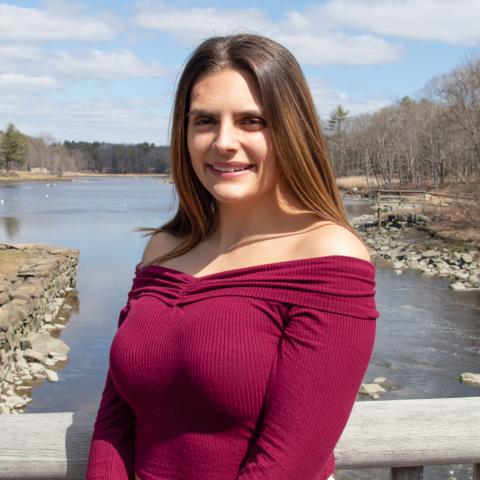
Community — it is the invisible string that holds us together. It’s the feeling of connection to something bigger than yourself. For Justice Ohanasian ’21, community-building is her calling, though she did not know it coming into college. When she was younger, she craved that sense of belonging and, through her time at UNH, she has not only discovered it in little pockets around campus but has made it her mission to help others feel included.
Having grown up in a neglectful home environment, Justice describes her upbringing as unconventional and difficult. She was consistently put in dangerous situations, but she found her escape in school and extracurriculars. She learned that if she did well academically, she could lay the groundwork for a different life. “At first, success was just a survival skill. But then, it became a foundation for everything in my life,” she said. When she was 10 years old, she was removed from her home and placed into the foster care system where she waited for three years to be adopted. “Being in foster care takes away any sense of belonging you have,” she explains. “It takes you away from everything you’ve ever known.” Going through that experience made her forever grateful to re-discover that acceptance in her new family. Justice continued to actively engage in academics and extracurriculars, determined to beat the odds of kids in foster care graduating from a four-year college (an alarming rate of less than 3%, according to the National Foster Youth Institute). She was adamant about carving her own path despite her past.
When she arrived on campus, Justice recalls once again losing the feeling of belonging in her first semester: “I didn’t have a word for it at the time, but I knew I wasn’t feeling that sense of community. Now in reflection I can see what I was trying to find.” Justice was invited to attend UNH’s Leadership Camp, and it proved to be pivotal moment in her college career. It was here that Justice first became aware of her desire to not only find connection on campus but create that feeling for others. After Leadership Camp, Justice wasted no time identifying communities she wanted to immerse herself in. Her involvements and extracurricular achievements quickly grew—resident assistant, Campus Activities Board Executive Board member, Slow Food Executive Board member, Students for Global Health member, Students of Social Work member, and Memorial Union Building Employee, to name a few. But joining student organizations and groups on campus was never about recognition or resume-bolstering; it was always about capturing that sense of community with others.
Justice has further integrated the theme of community into her undergraduate research. She had no intention of pursuing undergraduate research, but after taking a social work research class with Dr. Tarkington Newman, her perspective completely changed: “I learned that studying problems is the only way to create solutions,” she said. Under Dr. Newman, Justice has explored barriers to reporting sexual violence on college campuses. This research was originally supposed to take place in Granada, Spain, with funding from the Gilman International Scholarship Program, but the COVID-19 pandemic hit shortly after she arrived in country, forcing her to return home and rethink her approach to her study. Still, not even a pandemic could stop her from accomplishing her goal, and she instead conducted her research here on the UNH campus. A year and a half into her study, Justice has plans to present her findings in an academic setting and hopes her research will inform best practices for supporting sexual assault survivors at UNH. One of the biggest takeaways from her research? “I’ve learned through this study that having a sense of community among survivors is really important and can always be strengthened.”
Her approach to research exemplifies Justice’s capacity for empathy, which she learned through her difficult childhood and plans to incorporate into her post-graduate work. “There were a lot of scary things going on, things that no child should have to go through. But there was still love, there was still a sense of belonging. It taught me that a lot of things can co-exist, which is something that impacts me now going into the social work field,” Justice explains. Though Justice is passionate about championing identities that are often under-supported, her future in social work remains open, including her plans for after graduation. Justice is excited to explore a variety of avenues—policy work, community engagement and education, and therapy. But the countless options for where she could be in six months or a year are the reason she loves Social Work. The goal of her future work is clear: “I feel like I’ve always had a sense of responsibility to help others belong and to help others be vulnerable because for me, those are the things that saved my life and allowed me to thrive at UNH.”
